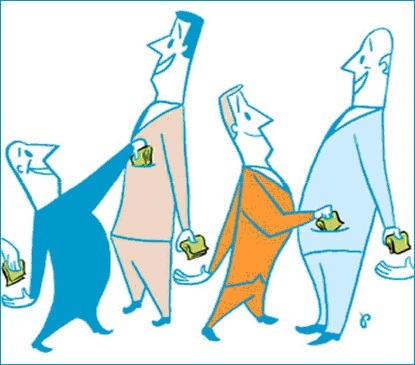“In organizations, this mirroring dynamic between leader and follower can become collusive. Followers are eager to use their leaders to reflect what they would like to see. Leaders, on the other hand, find the affirmation of followers hard to resist.” (Northouse, 2015.)
—–
Collusion: secret agreement of cooperation especially for an illegal or deceitful purpose. (Webster’s Dictionary, 2017)
—–
Think about what is written above, collusion, is this something that you really want to have an opportunity to reside in your company? The text Leadership: theory and practice, discusses mirroring and idealizing as something we have done since we were babies. We looked up to our mother first as someone to be like, then as we got older and experienced in business we have had mentors and leaders that we have wanted to emulate.
If you search for the word collusion, you will find various examples of the definition, but if you look up collusion under News you will find numerous articles of companies under investigation for collusion. Whether it be price-fixing, backdoor negotiating, or sexual favors collusion looks like an extremely bad thing existing in companies. So the bigger question now is, how do you prevent collusion?
The first thing we all must understand is that to have growth within organizations, there must be some type of mentorship program. This program needs to be designed to identify individuals who have the propensity to grow into greater leadership roles and have the traits indicative of organizational values. Once identified, those individuals need to have an opportunity on a consistent basis to speak to individuals in higher positions to gain more knowledge of responsible, leader behavior. This would allow those individuals opportunities to grow internally as well.
The textbook discusses Group Coaching as a way to apply a “very effective methodology for applying the psychodynamic principles to leadership development.” (Northouse, 2015). It talks about having an external facilitator conduct various surveys and feedback questionnaires aimed at understanding each individual (leader) on a more personal level. This seems like a great way to start understanding people, surveying is an easy way to grab a lot of peoples’ thoughts on a particular subject. The problem I see with this is that you cannot control the amount of thought that a person puts into the survey. So you may not be getting the true thoughts of a person and the true traits of some of the leaders being coached.
Once in the group coaching, each person is describing various things about themselves and the facilitator is there to help understand them and provide coaching to better those individuals. I find this type of forum ineffective because people are placed in front of others and will do anything to not be judged. I, personally, think a lot of the thoughts, feelings, and motives of each leader will be skewed to the more positive side to show people that they are “not that bad.”
Now, the textbook states that group coaching has several advantages:
1) “Highly intensive and effective intervention to prepare leaders for individual and organizational change.” (Northouse, 2015.)
2) “Ensures the team will assume a constructively challenging follow-up role supporting one another.” (Northouse, 2015.)
3) “In group coaching, individuals benefit because they become mutually invested in encouraging the new behaviors that each one has identified.” (Northouse, 2015.)
There are many more advantages to group coaching described in the textbook, I just feel like a lot of the emotions of leading will be left out because of the desire to be viewed as something they are not completely.
After this group coach activity the idea would obviously be to have those leaders go back to their daily jobs and provide greater opportunities to junior-level employees and grow the leadership. So with this power, what is the off-chance that someone would abuse that power, whether it be financially or sexually? There are numerous reports of senior-leaders using their position of power for gain, so does group coaching cover those things? How does it get discussed in an open forum to allow everyone an opportunity to break down the ethical side of leading? Because ultimately that’s what I’m getting at, ethics. Forget Group Coaching, interventions, mentorship counseling, how do WE ensure our senior leaders are ETHICAL and how do we allow our junior employees to see that we are ETHICAL? Thoughts…?







 Transformational leadership is defined as the style of leadership which “changes the status quo by appealing to followers’ values and their sense of higher purpose” (Hughes, Ginnett, & Curphy, 2012, p.577). These aforementioned values are otherwise known as ethics. Curiously, according to Turner et al. (2002), there is a notable lack of research relating to a “sociomoral dimension to leadership in organizations” (p.304). Because of that, in their study, Transformational Leadership and Moral Reasoning (2002), Turner et al. set out to examine the hypothesis that “leaders with higher moral reasoning are perceived by their subordinates as more transformational” (p.306).
Transformational leadership is defined as the style of leadership which “changes the status quo by appealing to followers’ values and their sense of higher purpose” (Hughes, Ginnett, & Curphy, 2012, p.577). These aforementioned values are otherwise known as ethics. Curiously, according to Turner et al. (2002), there is a notable lack of research relating to a “sociomoral dimension to leadership in organizations” (p.304). Because of that, in their study, Transformational Leadership and Moral Reasoning (2002), Turner et al. set out to examine the hypothesis that “leaders with higher moral reasoning are perceived by their subordinates as more transformational” (p.306).